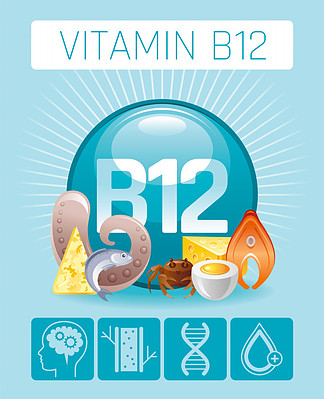Vitamin B12 Benefits: A Key Factor for Energy, Red Blood Cell Production, and More
Vitamin B12 is a crucial nutrient that our bodies depend on to function properly.
bodies depend on to function properly.
Here we will explore what vitamin B12 is, its primary functions and roles within our body, some of the best sources of this critical vitamin, and some key factors to consider if you are going to take a B12 supplement.
What Is Vitamin B12?
Vitamin B12, also known as cobalamin, is a water-soluble vitamin that is part of the B complex group of vitamins.
Water-soluble means that it can dissolve in water. In the case of B vitamins, this also means that any excesses are excreted via the kidneys and urine.
The body is able to store vitamin B12 in the liver for up to a few years at a time.
Roles and Functions of Vitamin B12
Vitamin B12 is responsible for many important functions and processes within our body.
These roles include:
- Red blood cell formation/oxygen delivery throughout the body
- Nerve and brain cell development
- DNA formation and synthesis
- Energy production
- Nerve tissue health
- Cognitive health including supporting memory and mood
- Nervous system function
- Eye health
- Part of the methylation cycle (an imperative series of physiological processes that involve detoxification, neurotransmitter metabolism, hormone balance, glutathione production, DNA expression, protein synthesis, and much more)
Symptoms of Vitamin B12 Deficiency
The symptoms that present when the body isn’t receiving or assimilating enough vitamin B12 are varied and many.
They include:
- Anemia (Specifically, 1) “Pernicious anemia,” which is a low red blood cell count due to an impaired ability to absorb vitamin B12 – this can be caused by low hydrochloric acid/stomach acid production, low intrinsic factor (a protein in the stomach that enables the body to absorb B12), some autoimmune conditions, a weakened stomach lining, and more or 2) “Megaloblastic anemia” which is when your red blood cells are too large due to a lack of vitamin B12 or vitamin B9/folate. Red blood cells decrease in size as they mature, and an adequate amount of these B vitamins is needed for this process to occur properly.)
- Fatigue
- Muscle weakness
- Angular cheilitis (cracks on the edges of your mouth)
- Tender or painful tongue, sometimes involving the formation of ulcers
- Mood swings
- Depression

- Memory problems
- Headaches
- Difficulty concentrating
- Nausea
- Diarrhea
- Decreased appetite
- Weight loss
- Abdominal cramping
- Digestive upset such as bloating
- Menstrual imbalances
- Numbness or tingling/”pins and needles” sensations in the hands and feet
- Difficulty walking or keeping your balance
- Rapid heart rate
- Dizziness
- Blurry vision
- Pale skin
- Shortness of breath
- More
The Best Food Sources of Vitamin B12
The foods that contain the highest levels of B12 include:
- Beef

- Chicken
- Lamb
- Organ meats
- Turkey
- Salmon
- Trout
- Tuna
- Haddock

- Crab
- Clams
- Mussels
- Eggs (especially the yolk)
- Cheese
- Yogurt
Vegetarian and vegan diets are often low in vitamin B12, so it is important for people following these types of eating plans to consider supplementation, as explained below.
Vitamin B12 Supplementation: Factors to Consider
Vitamin B12 supplements are best taken on an empty stomach and at least 5 to 6 hours away from bedtime, as they help with energy production and can interfere with sleep if taken too late in the day.
There are also a few additional elements to consider when it comes to vitamin B12 supplements, as not all B12 supplements are created equal.
There are a variety of different forms of vitamin B12 supplements, which include:
- Methylcobalamin
- Hydroxocobalamin
- Adenosylcobalamin
- Cyanocobalamin
Your own unique bioindividuality and genetic factors will determine how you respond to each of these forms of vitamin B12 supplements.
As a general rule, cyanocobalamin, which is the form you will find in the majority of supplements, is not the best tolerated. This form is synthetic and has to be converted to an active form in the body.
All of the other 3 forms listed above are naturally occurring and considered “active” forms of vitamin B12, which makes them more “bioavailable,” meaning they are better utilized by the body.
Additional factors to consider are:
- Vitamin B12 supplements are not well absorbed in the GI tract
Vitamin B12 supplements are not often absorbed very well in the gastrointestinal tract, so sublingual (under the tongue – usually in the form of a lozenge) administration, or the use of IV injections is often recommended for better absorption and assimilation.
A lot of natural health practitioners will offer IV treatments of various kinds in their office. These usually include vitamin B12, vitamin C, the superoxide dismutase antioxidant enzyme, glutathione, magnesium, zinc, and more.
IV administration can be an effective way to treat deficiencies because the vitamin is inserted straight into the blood stream, bypassing the gastrointestinal tract all together.
All 4 forms of vitamin B12 discussed above can be acquired via IV administration.
- Your genetics and expressive gene variants will determine how you tolerate certain forms of B12
Everyone has gene variants, also referred to as gene “mutations” or “Single Nucleotide Polymorphisms/SNPs.” This essentially means that the gene behaves abnormally, which impacts its proper functioning in a very wide variety of ways.
The gene variants that commonly impact vitamin B12 metabolism are MTHFR, MTRR, MTR, COMT, VDR, and some others.
When these gene variants are expressive, meaning they are activated and impacting your health, they can alter the way your body converts and metabolizes vitamin B12.
meaning they are activated and impacting your health, they can alter the way your body converts and metabolizes vitamin B12.
Vitamin B12 must be converted, or “activated” into a usable form so that the body can properly utilize it.
These gene variants can impede this process.
Therefore, in order to support this bioindividual factor, you will need to take the form of B12 that is best suited for your specific gene variant or set of related gene variants.
If the “wrong” form of B12 is taken, one may experience various “side effects” such as anxiety, trouble sleeping, and more.
Personally, I experience mild anxiety when taking methylcobalamin, but do very well when taking hyrdoxocobalamin and adenosylcobalamin. This is because of my specific set of expressive gene variants and their influence on the methylation cycle.
All of these factors are important to consider when choosing a B12 supplement and are worth discussing with your doctor so that you may experience the most benefit and highest absorption rate from the supplement you are taking.
In Closing…
As we’ve explored here, vitamin B12 is an important vitamin that is responsible for many key functions and processes in the human body.
Ensuring that you are acquiring optimal levels of B12 via your diet, and/or considering the use of individualized supplementation are significant steps to take in achieving and maintaining optimal health.
REFERENCES